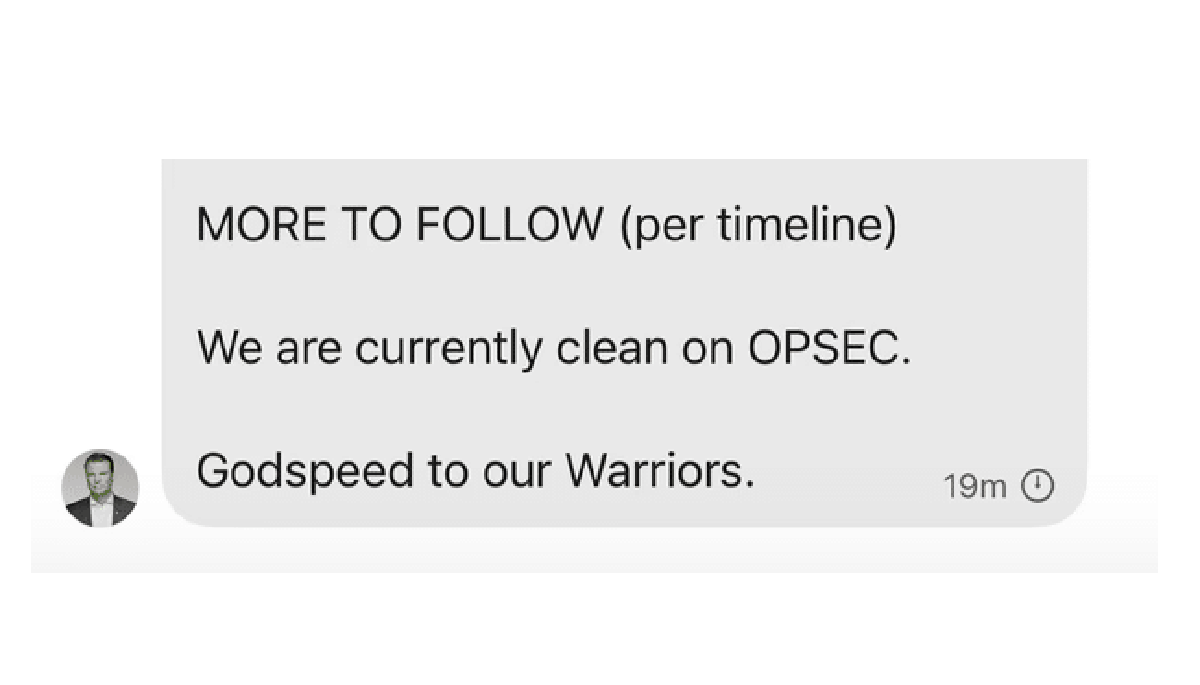#94: The Signal Scandal
Clearing My Tabs: Here are eight or so things I’ve found interesting while staying angry with the senior Trump regime leaders who shared national security information in a group chat.

“It might be helpful for you to know that you are not alone. And that in the long, twilight struggle which lies ahead of us, there is the possibility of hope.”
“The Long Twilight Struggle.” Babylon 5, created and written by J. Michael Straczynski, Season 2, Episode 20, 1995.
Here’s what I’ve found interesting:
- The multiple scandals of Signalgate;
- How The Atlantic’s editor took a significant risk by reporting on that group chat;
- Why national security leaders shouldn’t keep their Venmo transactions and friends public;
- We should not accept deporting people without due process or for their opinions;
- The US is becoming a dual state;
- How to think and act like a dissident movement; and
- Let’s not allow Trump to rewrite the history of the January 6, 2021, insurrection he instigated.
Here we go. I’m glad you’re here.
#1
- The Five Scandals (and One Fascinating Political Insight) of Signalgate (Garrett Graff, Doomsday Scenario, Link to Article)
- Signalgate: violating national security (Timothy Snyder, Thinking About, Link to Article)
We may have finally experienced a Trump Regime scandal that reporters and leading Democrats may be willing to take seriously for more than a single news cycle.
I suspect everyone reading this newsletter is aware of The Atlantic Editor-in-Chief Jeffrey Goldberg’s stunning announcement that he had been included in a group chat with senior Trump Regime officials about military strikes in Yemen. You also likely witnessed the Trump team react with so many character attacks, lies, and buck-passing that Goldberg decided he had to release the screenshots of the group chat in response.
As it usually does, the stonewalling has made a dire situation even worse. As Graff explains:
Across the last 48 hours, “Signalgate” has morphed from one scandal — the insane inclusion of one of the nation’s top journalists in one of the world’s most elite and secret group chats into what I think is best thought of as five distinct but overlapping scandals, as well as providing some fascinating political insight into who has power and how decisions get made in Trump II.
Graff’s five scandals include the massive leak of sensitive information, perjury to Congress, a criminal violation of the Federal Records Act, an information technology scandal, and the likely inadvertent admission of war crimes.
Even for the Trump-Musk Regime, that’s not a typical Monday.
Coincidentally, many of the senior officials who were included in the group chat had to testify to Congress the past couple of days. Democrats largely did their job highlighting the scandals during those hearings.
I hope they will see that fighting back can be enjoyable and politically advantageous because Democrats can’t let this scandal go. We must not minimize the ramifications of the Trump regime’s officials using personal phones and commercial software applications to exchange sensitive information.
As Timothy Snyder writes, these group chats also harm the American people because they are designed to keep us in the dark about these deliberations.
From the content of the group chat, it is clear that Signal (and, again, likely on personal phones) is the default way that Musk-Trump high officials communicate with one another. This group chat explicitly referred to another one. There was a protocol at the beginning of this chat, which seemed familiar to everyone. It involved adding people whose Signal numbers were known, as if this were a standard procedure. No one during the chat wrote anything like: "hey, why are we using Signal?" The reason that no one did so, most likely, is that they all do this every day.
Using Signal enables American authorities to violate the rights of Americans. Signal is attractive not because it is secure with respect to foreign adversaries, which it is not, but because it is secure with respect to American citizens and American judges. The autodelete function, which Mike Waltz was using, violates the law. But what is most essential is the purpose of that law: to protect the rights of Americans from their government. The timed deletion function allows American officials to be confident that their communications will never be recorded and that they can therefore conspire without any chance of their actions being known to citizens at the time or at any later point.
This is the kind of scandal Democrats must prioritize. It was a national security failure. Members of our military were put at risk. Senior government members are trying to hide their deliberations from the American people. Every person on that chat failed to protect sensitive and classified conversations. The fact that such a mistake is so easy to make is one of the reasons commercial apps like Signal are inappropriate for such discussions.
Even in the minority, Democrats have tools they can use to force a response. They’ve started by asking good questions and expressing outrage during this week’s hearings.
Senate Democrats should now place a hold on every national security, intelligence, and State Department appointment until the people involved in the group chat are held accountable.
Republicans place holds over made-up culture war disagreements. One of the worst national security mistakes we have seen in recent decades should generate a similar response.
After all, we don’t have to go that far into history to see what Republicans used to think about the need for secure communications. Media Matters’ Matthew Gertz compiled clips involving those involved in the Signal chat as a helpful reminder of what they used to think.
The Long Twilight Struggle is a reader-supported publication. To receive new posts and support my work, consider joining for free or becoming a paid subscriber to buy me coffee to drink while writing this newsletter.
#2
- The Atlantic Editor Who Broke “Signalgate” Did Nothing Wrong. He Could Be Prosecuted Anyway (Mark Rasch, Slate, Link to Article)
Yep. Jeffrey Goldberg has placed himself in jeopardy by exposing the Signal group chat. It’s not just because the Trump-Musk Regime has been aggressively attacking the press—they also can try to build upon a legal argument made by the Biden Administration last year in the case involving the release of an unaired antisemitic rant by Kanye West during an interview with Tucker Carlson.
Rasch is the attorney representing journalist Tim Burke in a case the Biden Administration pursued under the Computer Fraud and Abuse Act. As Rasch explains:
The government filed a motion in court claiming that journalists who publish other persons’ conversations can be prosecuted (irrespective of whether law permits the acquisition), but that they have available to them an “affirmative defense” that the parties consented to the acquisition, or that the communications were otherwise public. As an “affirmative defense” the government could go ahead with the prosecution, and the defendant would have to prove that they were not guilty.
As a practical matter, this means that reporters can be investigated, their offices raided and contents of decades’ worth of reporting seized, they can be indicted and prosecuted, but that a journalist like Goldberg could, at trial—and only at trial—present evidence that he was invited to the group chat, and the jury would be entitled to acquit him. The government has no burden of proving anything other than the fact that Goldberg “eavesdropped”—that is, that he acquired the contents of the communication. In short, the journalist must prove that he committed no crime. The Burke prosecutors claimed that the charged journalist “is better equipped to prove that an exception [to the wiretap prohibition] is available and to take advantage of that exception.” By that point, the damage is done.
National Security Advisor Mike Waltz tried to blame Goldberg for the security breach, asserting that he did not know how Goldberg got into the chat (even though the chat screenshots clearly show that Waltz was the person who added Goldberg).
Does anyone think Attorney General Pam Bondi and her team are not looking for ways to change the narrative by attacking Goldberg and charging him with illegally accessing classified information? And won’t it be convenient for Bondi to point to a Biden Administration precedent to do so?
#3
- Mike Waltz Left His Venmo Friends List Public (Dhruv Mehrotra and Tim Marchman, Wired, Link to Article)
- Even More Venmo Accounts Tied to Trump Officials in Signal Group Chat Left Data Public (Dhruv Mehrotra and Tim Marchman, Wired, Link to Article)
- Private Data and Passwords of Senior U.S. Security Officials Found Online (Patrick Beuth, Jörg Diehl, Roman Höfner, Roman Lehberger, Friederike Röhreke und Fidelius Schmid, Der Spiegel, Link to Article)
I am sure the intelligence services of many countries were pleased to see how awful Trump-Musk Regime officials are at information security.
You may think Venmo is just a convenient way to share expenses with friends and small businesses. But, if you don’t take steps to make your activity and friends lists private, they can create security risks by giving clues to intelligence services about how to target them. As Wired’s Mehrotra and Marchman explain:
A Venmo account under the name “Michael Waltz,” carrying a profile photo of the national security adviser and connected to accounts bearing the names of people closely associated with him, was left open to the public until Wednesday afternoon. A WIRED analysis shows that the account revealed the names of hundreds of Waltz’s personal and professional associates, including journalists, military officers, lobbyists, and others—information a foreign intelligence service or other actors could exploit for any number of ends, experts say.
Among the accounts linked to “Michael Waltz” are ones that appear to belong to Susie Wiles, the White House chief of staff, and Walker Barrett, a staffer on the United States National Security Council. Both were fellow participants in a now-infamous Signal group chat called “Houthi PC small group.”
Yep, this is the kind of information spies used to have to work a bit to find.
Worse, these Trump Regime officials left this information public even though Wired reported that Vice President JD Vance’s Venmo history and friends list were open to the public after Trump picked him to join the ticket last July.
How many times do Trump officials have to make this security mistake before they take the necessary precautions?
That question becomes even more urgent given the Der Spiegel report about how its reporters found the contact data of some of these Trump officials freely accessible on the Internet.
Private contact details of the most important security advisers to U.S. President Donald Trump can be found on the internet. DER SPIEGEL reporters were able to find mobile phone numbers, email addresses and even some passwords belonging to the top officials.
To do so, the reporters used commercial people search engines along with hacked customer data that has been published on the web. Those affected by the leaks include National Security Adviser Mike Waltz, Director of National Intelligence Tulsi Gabbard and Secretary of Defense Pete Hegseth.
People can die when national security officials fail to take operational and information security seriously. That’s why Congress needs to hold Trump officials responsible for these failures.
For the nation’s sake, I hope Democrats are up to the challenge—whether or not any self-proclaimed national security Republicans decide that enough is enough.
Also, Lindsey Adler has a helpful explainer on BlueSky for people who want to make their Venmo settings private.
#4
- Trump Immigration Nazis Kidnap Another Victim For Wrongthink (Evan Hurst, Wonkette, Link to Article)
- Footage shows masked ICE agents detaining Tufts graduate student (José Olivares, The Guardian, Link to Article)
I was taught that defending the right of people to say things you disagreed with was one of our nation’s most important civic values.
The Trump-Musk Regime, however, is using our immigration laws to detain people for opinions with which it disagrees. Apparently, this authoritarian outlook even applies to opinion pieces written in a college newspaper. Evan Hurst explains:
It’s happened again, or should we say, it’s happening again. At Tufts University in greater Boston this week, Donald Trump’s immigration Nazis — in hoodies, plainclothes, and masks that hide their faces — abducted a student from the street and disappeared her. It sounds like they’ve shipped her to Louisiana, like they did with Mahmoud Khalil. She’s here entirely legally on a student visa, a PhD student and Fulbright scholar from Türkiye. No official reasons have been given, because Trump and his Nazis don’t think human beings they don’t like deserve due process, but it appears it might have been about an article she wrote in the school newspaper.
Better hope you haven’t written any letters to the editor that might hurt Tiny Hands’s feelings, because as soon as he decides he thinks he can do this with citizens, hoo boy, it will be far too late. It may already be.
Her name is Rumeysa Ozturk, and the Tufts University school paper is as good as any other place for the tick-tock of what happened.
I don’t think these are the criminals Trump promised he’d deport during the campaign. Of course, the problem for Trump is that he—and his advisor, Stephen Miller—have been lying about the immigration situation and now need to figure out how to meet the MAGA base’s demands for public mass deportations.
There is no need to detain a student like this. They could have revoked her visa and given her 14 days to leave the country. She had committed no crimes and was not a danger to our community. But having masked people in hoodies take her off the street in daylight gave the MAGA people the dopamine hit they needed on social media.
Is Secretary of State Marco Rubio proud of his efforts to target students this way? Are Democrats proud they unanimously voted to confirm him (yep, it was 99-0), believing he’d be one of the adults in the room?
You don’t have to agree with what Ozturk co-wrote in the Tufts University newsletter. In fact, it’s more important to defend her rights if you disagree. It’s just the First Amendment that is on the line.
Thank you for reading The Long Twilight Struggle. This post is public, so please share it with your family and friends.
#5
- “You’re Here Because of Your Tattoos” (Noah Lanard and Isabela Dias, Mother Jones, Link to Article)
I am sure most of you aren’t surprised to learn that the Trump-Musk Regime’s deportation of Venezuelans to a notorious prison in El Salvador did not prioritize making sure the people being deported actually were criminals or members of a gang. Noah Lanard and Isabela Dias explain:
Mother Jones has spoken with friends, family members, and lawyers of ten men sent to El Salvador by the Trump administration based on allegations that they are members of the Venezuelan organized crime group Tren de Aragua. All of them say their relatives have tattoos and believe that is why their loved ones were targeted. But they vigorously reject the idea that their sons, brothers, and husbands have anything to do with Tren de Aragua, which the Trump administration recently labeled a foreign terrorist organization. The families have substantiated those assertions to Mother Jones, including—in many cases—by providing official documents attesting to their relatives’ lack of criminal histories in Venezuela. Such evidence might have persuaded US judges that the men were not part of any criminal organization had the Trump administration not deliberately deprived them of due process.
Due process matters. And the Fifth Amendment requires it. But, again, the Trump-Musk Regime needs to have splashy deportation stories to meet the demands of the MAGA base.
The United States has detained likely innocent people, sent them to a prison in another country, defied court orders, and then used them and other prisoners as part of a grotesque photo op.
We must not normalize any of this.
#6
- America Is Watching the Rise of a Dual State (Aziz Huq, The Atlantic, Link to Article)
Aziz Huq reminded me of an important book that helped me understand a key dynamic of this dangerous moment.
Our independent courts continue to operate. But now, some people are being excluded from their protection. History suggests that the circle being excluded will widen—often without advance warning.
Huq writes about Ernst Fraenkel, a Jewish labor lawyer who was able to work in Germany until 1938. Fraenkel explained these dynamics in his book The Dual State.
As Fraenkel explained it, a lawless dictatorship does not arise simply by snuffing out the ordinary legal system of rules, procedures, and precedents. To the contrary, that system—which he called the “normative state”—remains in place while dictatorial power spreads across society. What happens, Fraenkel explained, is insidious. Rather than completely eliminating the normative state, the Nazi regime slowly created a parallel zone in which “unlimited arbitrariness and violence unchecked by any legal guarantees” reigned freely. In this domain, which Fraenkel called the “prerogative state,” ordinary law didn’t apply. (A prerogative power is one that allows a person such as a monarch to act without regard to the laws on the books; theorists from John Locke onward have offered various formulations of the idea.) In this prerogative state, judges and other legal actors deferred to the racist hierarchies and ruthless expediencies of the Nazi regime.
The key here is that this prerogative state does not immediately and completely overrun the normative state. Rather, Fraenkel argued, dictatorships create a lawless zone that runs alongside the normative state. The two states cohabit uneasily and unstably. On any given day, people or cases could be jerked out of the normative state and into the prerogative one. In July 1936, for example, Fraenkel won a case for employees of an association taken over by the Nazis. A few days later, he learned that the Gestapo had seized the money owed to his clients and deposited it in the government’s coffers. Over time, the prerogative state would distort and slowly unravel the legal procedures of the normative state, leaving a smaller and smaller domain for ordinary law.
Yet, Fraenkel insisted, it was a mistake to think that even the Nazis would entirely dispense with normal laws. After all, they had a complex, broadly capitalist economy to maintain. “A nation of 80 million people,” he noted, needs stable rules. The trick was to find a way to keep the law going for Christian Germans who supported or at least tolerated the Nazis, while ruthlessly executing the führer’s directives against the state’s enemies, real and perceived. Capitalism could jog nicely alongside the brutal suppression of democracy, and even genocide.
Fraenkel experienced this dual state as a Jewish attorney who was able to keep working because he qualified for an exclusion as a World War I veteran. One day, he was successfully defending clients. Then he learned that he and his wife were included on a Gestapo list.
Huq explains how the Trump Regime is building a prerogative state with pardons of insurrectionists, purges of career lawyers, retribution against opponents, and the appointment of justice officials who are loyal to Trump and not the Constitution.
I hope understanding more about how this process works will help us fight against it.
#7
- How to Think (and Act) Like a Dissident Movement (Jonathan V. Last, The Bulwark, Link to Article)
Defeating the Trump-Musk Regime will require a large and ideologically diverse coalition, and Jonathan V. Last makes an excellent argument that we should seek to emulate successful dissident movements.
We now see that most institutions are weak in the face of authoritarianism.
JVL’s Law is: Any institution not explicitly anti-Trump will eventually become useful to Trump. I originally thought this would apply only to media orgs. Turns out that it applies to everyone and everything. From Ross Douthat to John Fetterman, from Paul Weiss to Facebook. All of our institutions are the Republican party now.
This is an extraordinary moment and it requires extraordinary vision and actions. We must stop viewing political life through the lens of American politics as we have known it, and adopt the viewpoint of dissident movements in autocratic states.
This is not the time for typical opposition politics. This is not a normal political moment. We need our leaders to demonstrate that they understand.
This is why I’m so frustrated with Senate Democratic Leader Chuck Schumer and many of his caucus colleagues. They admit they are trying to relive 2017 and wait until Republican popularity shrinks.
But in a dual state, popularity matters less and less over time.
Last explains the tactics used by dissident movements that our anti-Trump coalition can emulate. We can see how efforts to support each other can come together successfully. As he writes:
Find a leader. Bring people together in person, far away from the capital’s control. Build momentum. Organize your supporters. Harness the power of their mass. Build toward an explicit show of strength. Take back control of Congress.
And then, if we’re lucky, we can start thinking about an endgame.
In the meantime, fight the authoritarians on everything. If the stock market drops, scream about it. Because it’s their fault. When a kid dies of measles—their fault. Attack them every day, on whatever the latest thing is. Turn “flood the zone” against them by not needing to cling to any one outrage for weeks. Embrace the idea of snapping up new outrages every day.
Yeah, that’s a good plan.
#8
- The Reality of the January 6, 2021, Insurrection
On January 6, 2021, Donald Trump instigated a violent insurrection against the United States government. Here’s a video from the Select Committee to Investigate the January 6th Attack on the United States Capitol that one can review if their memory fades.
People were hurt and police officers died protecting the Capitol. Vice President Pence and other elected officials just barely escaped danger. Our national streak of peaceful transfers of power ended.
It was not, as Trump claims, a “day of love.” And we must resist his efforts to rewrite the history of that dark day.
Post-Game Comments
Today’s Thought from my Readwise collection:
“‘History isn’t something you need to bring to life. History already is alive. We are history. History isn’t politicians or kings and queens. History is everyone. It is everything. It’s that coffee. You could explain much of the whole history of capitalism and empire and slavery just by talking about coffee. The amount of blood and misery that has taken place for us to sit here and sip coffee out of paper cups is incredible.’
‘You’ve put me right off my drink.’
‘Oh, sorry. But the point is: history is everywhere. It’s about making people realise that. It makes you understand a place.’
‘Right.’
‘History is people. Everyone loves history.’”—Matt Haig, How to Stop Time
Thank you for reading! This post is public, so feel free to share it.
Thank you for reading my newsletter. Please let me know what you think about what you’ve read—and send me things you’ve found interesting! You can email me at craigcheslog@substack.com.
The Long Twilight Struggle is free and supported voluntarily by its readers. If you liked what you read, please consider buying me a coffee to drink while I write it by becoming a paid subscriber or sponsor.



